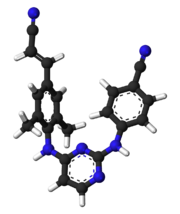Rilpivirine
 |
|
 |
|
| Clinical data | |
|---|---|
| Trade names | Edurant |
| AHFS/Drugs.com | Consumer Drug Information |
| MedlinePlus | a611037 |
| License data |
|
| Pregnancy category |
|
| Routes of administration |
Oral |
| ATC code | |
| Legal status | |
| Legal status |
|
| Pharmacokinetic data | |
| Biological half-life | 38 hours |
| Identifiers | |
|
|
| CAS Number | |
| PubChem CID | |
| ChemSpider | |
| UNII | |
| KEGG | |
| ChEBI | |
| ChEMBL | |
| NIAID ChemDB | |
| PDB ligand | |
| ECHA InfoCard | 100.224.394 |
| Chemical and physical data | |
| Formula | C22H18N6 |
| Molar mass | 366.42 g/mol |
|
|
|
|
|
Rilpivirine (TMC278, trade name Edurant) is a pharmaceutical drug, developed by Tibotec, for the treatment of HIV infection. It is a second-generation non-nucleoside reverse transcriptase inhibitor (NNRTI) with higher potency, longer half-life and reduced side-effect profile compared with older NNRTIs, such as efavirenz.
Rilpivirine entered phase III clinical trials in April 2008, and was approved for use in the United States in May 2011. A fixed-dose drug combining rilpivirine with emtricitabine and tenofovir, was approved by the U.S. Food and Drug Administration in August 2011 under the brand name Complera; it was licensed in the European Union under the brand name Eviplera in November 2011.
Like etravirine, a second-generation NNRTI approved in 2008, rilpivirine is a diarylpyrimidine (DAPY). Rilpivirine in combination with emtricitabine and tenofovir has been shown to have higher rates of virologic failure than Atripla in patients with baseline HIV viral loads greater than 100,000 copies/mm3.
...
Wikipedia
